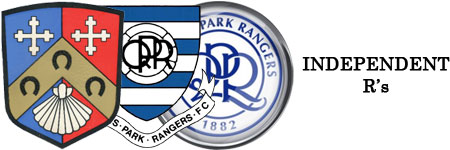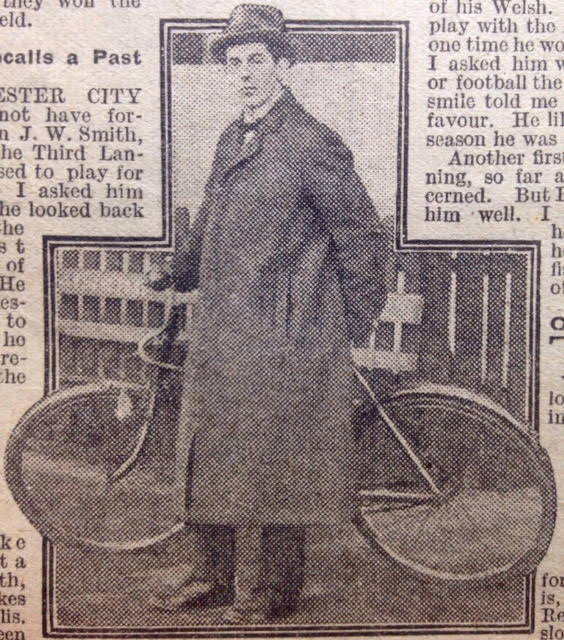Previously known as ‘The Football Favourite’ until the 30th April 1921, ‘The Football and Sports Favourite’ was a weekly newspaper, costing 2d. ‘Peeping Tom’ went behind the scenes with QPR and this fascinating article appeared on 14th May 1921:
‘Although there was no intimation to “knock and walk in,” that is what I did on reaching the dressing-room at the Queen’s Park Rangers Football Club. On entering, I noticed several players, one of whom smartly dressed and with coloured socks and patent shoes, was having the lower part of his leg massaged by Dick Draper, the trainer.
I soon found it to be Archie Mitchell, the centre-half and captain of the team. I was glad to learn that there was nothing more serious the matter than a little stiffness.
I asked Archie how long he had been with the QPR’s, and was surprised when he told me 14 years. He is very happy with the Rangers, has settled down in the neighbourhood, and is the father of a bonny little girl.
In conversation I gathered from Archie that one of the most exciting tussles he had ever been in took place some years ago – in the fourth round of the Cup with Liverpool, when the latter team beat the wearers of the green and white by the odd goal in three. A.M. is an old Villa player, and a native of Smethwick. I am told he is quite a fine billiard player too.
Placing the ‘Football Favourite’ on the table of the dressing-room, two or three of the players made for it, and immediately began wallowing into its glorious contents. Hill, the goalkeeper, told me he knew the magazine, in which he had previously invested.
He is spending his first season with the QPR’s. When a boy at school, he used to watch them play with more or less envious eyes, and now other boys watch him play, and doubtless the same adjective applies to their optics. L.H., though a Londoner by birth, has spent most of his time in Southend. He started playing for Southend in his early teens.
It was at Southend-on-Sea he once had the misfortune to break a couple of bones in his hand. His injury was quickly bound up, a back was put into goal, and Hill played at outside-right. Both he and the back acquitted themselves very creditably in these strange positions. This is his first year as a professional, he having previously worked with his father in the woollen trade.
Jimmy Birch is another old Villa man. During the war period he played for Notts Forest, and was with them when they won the war-time Shield.
Manchester City will not have forgotten J.W. Smith, nor yet will the Third Lanark, for he used to play for both teams. I asked him what match he looked back upon
with the greatest amount of satisfaction. He found my questions difficult to answer, but he has a keen recollection of the match with Brentford when he helped the Rangers to win the Professional Charity Cup.
Unlike Hill, he is not a London youth, but greatly likes the metropolis. He has been with the Rangers several seasons, and has followed the example of most members of the team, being a married man with a couple of promising kiddies.
He can do something else besides kick a football in the way the captain of the QPR’s wants it to go. He is in partnership with another, and I see from the business card he gave me, he is in the paper-hanging, house-decorating, sign-writing, etc. trade at Shepherd’s Bush. This is a free advertisement for you, J.W.S., but I think you deserve it.
I was chatting away with the boys when Mr E. Liddell, the manager, burst into the room. He was not present when I arrived and consequently I, so to speak, carried on. I thought at first he might be a little angry, finding me in the dressing-room, but taking up the ‘Football Favourite’ I mildly brandished it before his eyes, at the same time giving a brief explanation and all was joy and peace.
He left me to my own devices, and with a “see you later” attitude proceeded to the Board Room, where he was anxious to get in conversation over the telephone with one of the Directors.
Mr J. H. Fielding is Chairman of the club, and here is an interesting little point about Mr Fielding. His son, Mr C. W. Fielding, has recently become a member of the Board of Directors. He is the youngest and latest member of the directorate.
Before to-day, I fancy, he has worn the Rangers jersey. Anyway, he is a keen football enthusiast, and has a most intimate knowledge of the game. A thoroughly good sportsman. Didn’t see him. Should have liked to.
A comparatively new-comer to the team is Marsden. He has strained his thigh a bit and was having it rubbed by the trainer. Whilst in recumbent attitude he told me he had previously played as an amateur for Port Vale. He is a Stoke man, and is versed in mechanical engineering.
Bob Faulkner, outside-right, is another new man. I gleaned from him that he used to play with Lorimer, of the Spurs, when in Scotland. For a while he was with Blackburn Rovers.
R. John, who is more accustomed to Welsh than English, could perhaps make as little of my English as I could of his Welsh. He told me he used to play with the Aberaman Athletic. At one time he worked in the Welsh mines. I asked him
whether he liked mining or football the better, and a convincing smile told me that the latter was in favour. He likes London much. Last season he was with the Crystal Palace.
Another first season man is J. Manning, so far as the Rangers are concerned. But Rotherham County know him well. I asked J. M. what his hobbies in life were, and he owned up to a little fishing. He is also fond of quoits.
There were several old players I did not see. I was looking forward to shaking hands with Blackman and Middlemiss, the latter of course, of White Hart Lane fame. Some of the players, however, are at work during the day.
Price, the reserve goalie, for example, who played for Brentford last season, is, I believe, in the Army Records Office at Hounslow, and Gregory, I think, does clerical work for Mr Fielding.
Trainer Draper has been with the Rangers for 15 or 16 years. He used to play full-back for the club, and has done so even since his appointment as trainer. Dick learnt his football at Kettering.
Leaving the dressing-room, I rooted out Mr Liddell, whom I knew to be an old player. I asked him to give me his career in a nutshell.
Here it is: Born in Sunderland and started to play football with the Sunderland Black Watch. Went from there to Whitburn, in Durham, and then to Seaham Harbour. Turned professional and joined Southampton in 1905. From thence to Clapton Orient, spending seven seasons with the Homerton boys; afterwards went to Arsenal for nearly as long. Then appointed manager for Southend United. Has been with the QPR’s only a few months, taking the place of Mr Howie, who has now become manager of the Middlesbrough FC.
One of Mr Liddell’s most exciting matches was when playing for the Orient in the first round of the FA Cup against Everton – a team of many talents. The Orient held their own, winning only by the narrow margin of a goal.
Speaking of the members of the club, Mr Liddell said, “They’re a steady lot of chaps, and I have not the least trouble with them. There’s not what you might call a drinking man amongst them, and several are T.T.’s. They’re loyal and conscientious, and I would not wish to be associated with a better set.”
Cook’s the excursion people, usually carry out the arrangements for the team when they travel, charging an inclusive fee for the railway ticket and a meal on board.
I had left Mr Liddell and was just making my exit from the enclosure when a smart looking cyclist came riding up, and dismounting, I heard the manager greet him as “Doctor”. So I mused with myself – soliloquised, I think, is the right word – and said, “That is without a doubt the club doctor.”
He was closeted with Mr Liddell in the Board Room for some few moments. But I decided to hang around until he emerged and I further decided that if Mr L. did not introduce me I would ask him to kindly do so.
But Mr L. did. I shook hands with the doctor, and bearing in mind that in my peregrinations I had not previously had the good fortune to meet a club doctor, I got into conversation with Dr. Bell – for that’s his name.
I found he used to be at Edinburgh University, and played a lot of Rugby there. For one year he was president of the Edinburgh University Athletic Club. Before going there he was at Winchester College, where he played Soccer. Dr. Bell attends practically all the home matches.
During the war he was a medical officer to the Government and was stationed at Wei-hai-Wei, where he examined thousands of coolies who were sent over to France. By way of a little recreation he would sometimes play football with English marines, and every now and then some of the Chinese boys from the Mission School there would take part in the games.
The doctor and his bike are inseparable. I asked him if I might snap him with it, and – well, you can see I managed to do so.
Right sorry was I not to meet Mr W. L. Wood, the secretary, neither was I fortunate enough to get a word with him over the ‘phone, but the QPR people said agreeable things about him, and I have no doubt he deserves the esteem in which he is held.’
‘Peeping Tom’ previously appeared on the Home Page on the 2nd December 2010 when I included the ‘Sports Budget’ article titled: ‘Rangers Travelling Stand & ‘Peeping Tom’ Visits Loftus Road’
Steve Russell



Excellent article. Amazing behind the scenes detail.
Can you imagine a football manager today being so relaxed about media intrusion in a dressing room as our Mr Liddell?
Great article from a fascinating period in our history.
The line up picture looks like something from the Valentines Day Massacre!
Great article Steve! Intriguing to see that there were players from the earliest Park Royal days still at the Rs in 1921